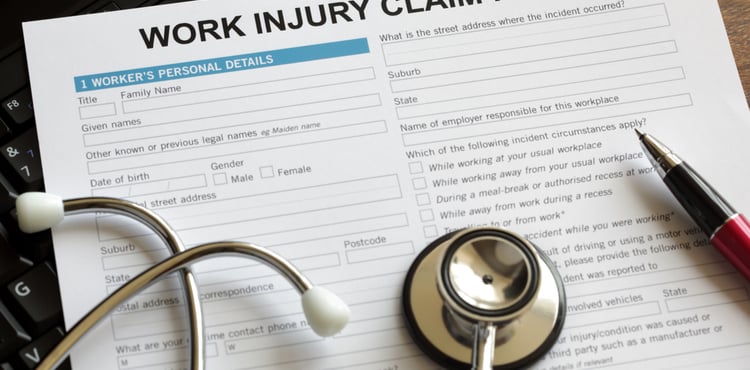What is considered a workers’ compensation injury?

When an employee is injured on the job or develops an occupational illness, in most cases it is considered a workers’ compensation injury that is eligible for a claim with your business insurance policy.
If the claim is approved, the employee can receive medical coverage, wage replacement, and other benefits following a workers’ comp injury. However, to access these benefits, both the employee and employer must follow certain steps to ensure the injury is compensable.
The process of filing a workers’ comp claim for a workplace injury or illness can be a bit complex because multiple parties are involved: the employee, the employer, the insurance company, the healthcare provider, and the state’s workers’ comp board.
What is considered a workplace injury?
Most injuries that occur on the job are covered by workers’ comp insurance, including accidents and illnesses caused by exposure to work activities, materials, and equipment.
As soon as an employee suffers an occupational injury that is covered by workers’ comp insurance, time is of the essence. The employee has a limited number of days to report the incident and collect benefits.
Typically, injured workers should report an occupational injury to the employer as soon as it occurs. If there is a delay in filing the claim, the insurance provider could potentially deny the employee compensation benefits. The delay may also give your carrier the impression that the claim isn’t legitimate.

What does workers’ compensation insurance not cover?
Workers’ comp insurance generally doesn’t cover:
- Stress or other psychiatric disorders
- Self-inflicted injuries
- Injuries caused by fighting or horseplay
- Injuries incurred while committing a crime, while under the influence of drugs or alcohol, or while violating company policies
For cumulative work injuries or illnesses, the area gets a little grayer. For example, say your creative agency employs a web designer who develops carpal tunnel syndrome over time. Generally, the clock starts ticking on this claim when:
- The writer took time off work because of the injury.
- The writer knew that the injury was caused by work.
How to file a workers’ comp claim following a workplace injury
To initiate the claims process, an employee must:
- Notify the employer about the work injury or illness (including the date, time, type of injury, and how the injury occurred)
- File a formal workers’ comp claim
From there, the insurance company will choose a doctor to conduct an independent medical examination. The doctor will report the results to the insurance company, which uses the report to create its compensation offer.
The workers’ comp claims process and statute of limitations differ slightly from state to state. Learn more about the workers’ comp laws in states where you do business.
When to file a workers’ comp claim
Your employee is eligible for workers’ comp benefits if all of the following statements are true:
- The injured worker is an employee of your small business (not an independent contractor).
- The employer has workers’ comp insurance.
- The employee was hurt as a result of job-related duties.
Workers’ comp statute of limitations
Different states have varying statutes of limitations for filing workers' comp claims. Depending on where your employees are located, they have a specific deadline to file a claim. The deadline could vary based on the type of injury, as well. For instance, in California, the statute of limitations for filing a workers’ comp claim is one year from the date of the injury.
Employees have deadlines for notifying the employer about the injury. In most cases, the worker must notify the employer within 30 to 45 days of the injury. For example, in Missouri, employees who fail to notify the employer about injuries within 30 days can jeopardize their ability to receive workers’ comp benefits.
Workers can notify employers with a formal letter or email detailing the work injury, or informally, such as mentioning wrist pain caused by typing all day. To err on the side of caution, always ask an injured employee to submit a written notification of the incident detailing the nature of the ailment and when, how, and where it occurred.
Compare workers’ comp quotes from trusted carriers with Insureon
Complete Insureon’s easy online application today to compare quotes for workers' compensation and other types of insurance from top-rated U.S. carriers. Once you find the right policy for your small business, you can begin coverage in less than 24 hours.
Brian Carlton, Contributing Writer
Brian is a contributing writer that has experience covering finance, insurance, and education. He has award-winning journalism and writing experience that covers several topics like insurance, finance, and education.









